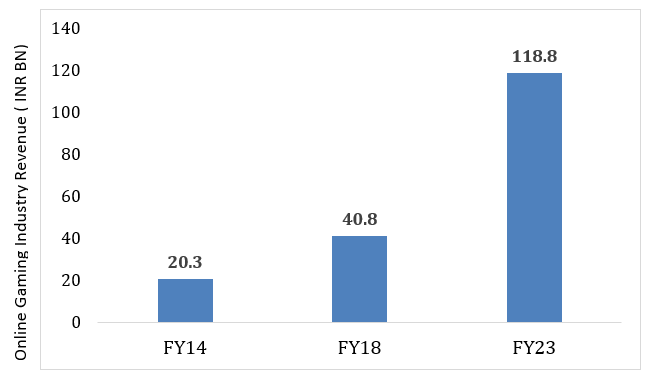With continuous investment, sports have become a business industry and has intertwined into everyday life. Nobody can escape the influence of sport, either as a spectator or a participant – it’s everywhere. This spurge in business aspect of sports, has led to sports betting being in the forefront of a way, for the public to have a share of the business.
Sports betting is legal in many parts of the world, including Australia and Western Europe, with the largest legal market in the U.K. However, even when it’s not legally permitted, the market has flourished, bringing close to $1.8 trillion dollars globally. United States of America have been the latest country to legalize betting in some states and according to the reports this decision has brought in various advantages for the economy from creation of jobs (estimated between 125,000-152,000 jobs) to an estimated annual revenue of $6 billion for the states by 2023. These favourable outcomes have made other countries like India, to look at betting as an additional form of revenue for the government.
Current State Of Sports Betting In India
According to the PUBLIC GAMBLING ACT OF 1867 which is nearly 150 years old, the government of India prohibits gambling. According to this law, prohibition only applies to “game of chance” and not to a “game of skill”. The only exception is horse racing, which was made legal in 1996. These laws have led to a thriving illegal sports betting market in India.
Illegal betting in India has been happening since the 20th century, this betting mostly happens in cricket as India being a cricket fanatic country. This betting happens underground and sometimes, criminals managing bookies. Inevitable outcome of this system has been money laundering, fixing of matches and image of sportsmen getting deteriorated. This system is prevalent in other sports also and this is leading to cases of match fixing and point shaving, coming more in the limelight. With the emergence of private tournaments in all these sports like IPL (Indian Premier League) and ISL (Indian Soccer League), the underground illegal market continues to grow and expand. The Federation of Indian Chambers of Commerce & Industry (FICCI) estimates that money to the tune of Rs. 3 lakh crore changes hands every year, mainly through bookies, international websites, or technology-enabled channels such as encrypted chat rooms.
While the illegal market is thriving due to lack of regulations, there has been an advent of start-ups in this field, which uses technology, that allows anyone to bet by just a click on the screen. These companies allow the customer to make their own fantasy teams and compete against other teams. These companies mainly focus on fantasy sports, which unlike sports betting, is deemed a “game of skill”, and hence a legal business activity in India.
The number of start-ups in this space have increase ten-fold, with Dream-11 being the biggest, attaining the coveted ‘Unicorn’ tag. According to KPMG, the online gaming market has witnessed exponential growth over the past few years, with revenue expected to touch nearly Rs. 118 billion in FY19. These companies mainly focus on fantasy sports, which unlike sports betting, is deemed a “game of skill”, and hence a legal business activity in India.

Advantages Of Legalizing Sports Betting
The advantage is not for just the customers who could earn an extra buck using their sports knowledge, the advantages are for everyone, mainly the government. Below are the mentioned advantages that India could achieve:
Additional Revenue
The Indian government is always looking for ways to drum up new resource sources, to fund new projects. Generally, it does by borrowing or by increasing indirect taxes. A legalized sports betting system as seen in the other parts of the world provides an additional stream to generate revenue and fund projects. Legalizing such a system in India will provide the country with a way to generate additional revenue without cutting or spending tax revenue. The revenue could go then in different projects from upgrading stadiums, to issues that affect the citizens of the country like lack of health care and poverty.
Employment
Introducing a new industry will inevitably result in demand for workers. These jobs will not be in the sports betting industry alone. Legalizing sports betting in any state will increase the clientele in that state. An increased clientele will result in more customers for local business, who in turn will increase revenue which they can spend to create more jobs and improve their own business. For example, local business in states like Goa that attracts tourists through casinos can experience the benefits mentioned above. States that are not famous for casinos will also be able to experience an increase in employment.
Establishing a sports system will require employing people of all dimensions. Employees will be necessary to manage the sports books and records. People (Vendors) would be required to offer the lotteries/wagers to the public. It will also create employment if sports betting through website and mobile applications is allowed. Graphic designers will be required and computer programmers will be needed to create an efficient and secure program. Lawyers will be required to interpret these laws and accountants will be needed to oversee the finance involved. The number of jobs created will depend on how the law, if approved, is implemented and how the public accepts it.
Decrease In Crime
Illegal sports betting in India has been prevalent for some years now and with the emergence of internet and new technology, this growth has increased by a good rate. With no proper laws covering this, illegal activities have risen and are a grave concern to the government and the sports organizations. Illegal sports betting is alive and thriving in India, especially cricket, seems to being facing the most adverse effects of this. These rings have connections to crime lords and gangsters. In some instances, these illegal gambling rings accepted bets through dark web, phone calls and other ways, which are hard to track. The revenue earned by this illegal wager is used to fund other illegal activities such as extortion and buying of arms.
The Downside To Legal Sports Betting
Admittedly, legalizing sports betting does come with some negative results. Experts within the sports organizations and owners of sports teams feel that a legalized betting system, within India will hamper the integrity of the game. Problems have been voiced about the betting system in countries which have legalized it about the inability to provide adequate measures to curb gambling addictions and allegations against fixing and point shaving. If India does adopt a legalized sports betting system it can look at the problems faced by these countries and try avoiding them.
Integrity Of The Game
Players, coach and referees are the ones who decide the outcome of the game, some people believe that if they are also allowed to bet, they would shift the outcome to favour their wagers. India has been custom to these illegal practices for some time now. During the 2013 edition of IPL (Indian Premier League), police arrested 3 players of Rajasthan Royal franchise and also arrested 11 bookmakers. After further investigation, it was found that this ring involved actors, businessman and also Mr. Gurunath Meiyappan a top official of one of the franchises in IPL (Chennai Super Kings). This corruption scandal is one of the many that has come into light, these are done by paying the players to not play at their level (For example telling a bowler to bowl no-balls or wide purposefully). These players are given a huge sums of money to do this and with no proper regulation to tackle this, this situation will continue to persist and grow.
United Kingdom and United States faced the same problems and they decided to tackle this problem by placing the owners of the franchises, the player association and the government together and to come to an agreement, regarding this adversity. Players, owners and the association have collectively agreed to an anti- gambling clause which is inserted into league collective bargaining agreement. One of the recent agreements in the EPL (English Premier League) contains an “Integrity of Game” clause. In this agreement a player acknowledges “his awareness that if he accepts a bribe or agrees to throw or fix an EPL game; fails to promptly report a bribe offer or an attempt to throw or fix an EPL game; bets on an EPL game; [or] knowingly associates with gamblers or gambling activity,” the league and the association will have the right to fine him, suspend him, and/or terminate his contract. There have been other ways to curb this problem which have been adopted like limiting the bets or banning certain people from placing bets. India can also take cue about how the problem were tackled by these countries and find a solution, which is in collaboration with all the concerned parties from players to governments.
Gambling Addiction
Gambling is very addictive, winning a bet when the odds are against you is often described as a top of the world feeling and it is easy how people are addicted to it, as it is available 24*7 and at the touch of your hand. According to the Gambling commission in UK, more than 350,000 people are either problem gamblers or at the risk of addiction, the commission also points out that the government and industry are not doing enough to tackle the problem. United Kingdom earns enormous revenues from betting industry, but only 0.1-0.3% is put towards combating gambling addictions. The same scenario persists in most of the countries, with legalized betting system.
The vast majority of the people who are labelled as ‘problem gamblers’ do not seek help for their addiction. If a gambling problem is left to develop, it can lead to depression, anxiety and other serious psychological disorders, which can affect their professional and personal lives. The most important thing when tackling addiction is by investing in rehab centres, which can help the person both personally and professionally. Also increase in investment in these centres would not be a burden on the government, as the income earned by sports betting can be used here.
India can make a legalized sports betting work and it should use other countries like United Kingdom system as a reference. Looking at the current state of sports in India and the organizations handling it, India can adopt the following measures according to the author which would help in maintaining the integrity of the sport and also reaping its benefits.
Autonomous Regulation Of The Industry
Adopting standards set by the industry, with a degree of governmental regulation, is the best way to carry out this process. Having own set of standards and procedure, would have the following advantages-
1. Sports betting is a complex phenomenon like stock markets, with variations in different games, the element of skill and the level of technological knowledge required. It will be efficient if the industry which has the pre requisite knowledge requirement sets the standards for this. The other way could be setting an exam which needs to be passed to legally bet.
2. The industry bodies appointed to carry out the activities of rule-making and monitoring, will free the state resources, which can be used for other issues affecting the state.
3. Transparency is a critical aspect of sports betting, there would be an increase in transparency in the market if the consumers would be able to identify the gaming operators by the certification provided by these bodies.
4. Gambling operators and firms will be told to be member of these autonomous regulation bodies. This will ensure better compliance of the law and also suggestions given by these firms can be put into action by these bodies.
Open Licensing System
There should be strict licensing condition set by the government and the autonomous body set by the government should be allowed to issue the licenses. The government should not set a restriction on how many operators can practice betting in the market. Equally, there should be no prohibition on the betting types the operators can provide to the public. If these are not done, then the Indian consumer will resort to offshore unlicensed operators to handle their wagers.
The spread of sports in India coupled with the continued growth of technology, sports betting is here to stay and expected to grow at an exponential way even during the pandemic. The government needs to jump on the ship and take steps to legalise betting. The success stories of Goa which earns in crores of rupees, should be a sign of encouragement for the Government, who could earn so much more, with a much bigger population. Of course, there are problems. There will be. But legalisation of betting more than offsets the negative effects of not legalising it.
Regulated gambling is, therefore, an idea whose time has come and wouldn’t it be great that you could earn an extra buck through your sports knowledge?
Follow Us @
Some Unrelated Stories!




